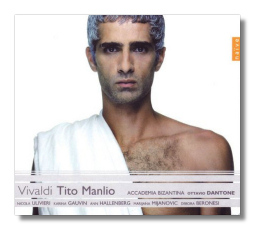
The Internet's Premier Classical Music Source
Related Links
- Vivaldi Reviews
- Latest Reviews
- More Reviews
-
By Composer
-
Collections
DVD & Blu-ray
Books
Concert Reviews
Articles/Interviews
Software
Audio
Search Amazon
Recommended Links
Site News
 CD Review
CD Review
Antonio Vivaldi

Tito Manlio, RV 738
- Nicola Ulivieri (Tito)
- Karina Gauvin (Manlio)
- Ann Hallenberg (Servilia)
- Marijana Mijanovic (Vitellia)
- Debora Beronesi (Lucio)
- Barbara Di Castri (Decio)
- Mark Milhofer (Geminio)
- Christian Senn (Lindo)
Accademia Bizantina/Ottavio Dantone
Naïve OP30413 DDD 3CDs: 63:16, 60:08, 61:33
Tito Manlio, Vivaldi's eighth completed opera, dates from a brief but happy period when the composer's patron was Philip of Hesse-Darmstadt, the Imperial Governor of Mantua – a man who appreciated the arts and who was willing to reach deeply into his pockets to support grand operatic productions. Tito Manlio was a last-minute commission to celebrate Philip's upcoming marriage to the Princess Eleonora di Guastalla early in 1719. Vivaldi managed to complete the opera in five days… and then the wedding was called off! The opera was not completely scrapped – carnival season was coming – but Vivaldi must have been disappointed to have his expectations raised so high only to see them channeled elsewhere.
The plot is unimportant except as a framework for Vivaldi's music. The setting is Rome some centuries before the birth of Christ and concerns the conflict between the Romans and the Latins, who, once allies, now are in conflict because the Roman Senate has refused to allow a Latin to share in the city's government. At the start of the opera, Tito Manlio, a Roman consul, is punishing those who will not swear allegiance to Rome – mostly, it turns out, because of romantic entanglements. These "traitors" include Vitellia, Tito Manlio's daughter, and Servilia, the betrothed of his son Manlio. The generations are divided, but after many convolutions, all is reconciled and a happy ending is achieved thanks to the noble actions of Manlio, and also to Tito Manlio's magnanimity.
Vivaldi's music shows no signs of having been written hastily. The opera is like a long banquet with many courses, varied seasonings, and contrasting flavors. As is often the case in Baroque opera, everyone gets a least one aria. Some of these are very short, and others are quite long. Da capo form is used prominently, and when the "A" section returns, conductor Dantone embellishes or varies the vocal line in various ways. (I gather from the booklet notes that he, not the singers, was responsible for writing out the variants.) Vivaldi must have had very fine singers in Mantua, because his music requires incredible virtuosity and temperament. He also must have had access to excellent instrumentalists, because the richness of the orchestral writing is remarkable, and there is masterful writing for solo instruments in several of the arias. Tito Manlio is a superb score, and at just over three hours, it makes a perfect evening's entertainment for home listening. If you've never heard any of Vivaldi's operas, Tito Manlio would be a good place to start.
This particular recording would be a good place to start too. The opera was recorded for the first time in the 1970s for Philips by conductor Vittorio Negri. That recording was reissued on CD, but not widely, apparently, because I've never seen a copy of it. Now we have two new recordings of it released in the same month: this one, and one on the CPO label conducted by Federico Maria Sardelli. I have not heard the latter, and my comments here will be confined to the Naïve release, which is part of the label's ongoing Vivaldi series. The bad news first: the score is not given uncut, and dozens of "[…]" marks in the libretto tell the tale. (The Negri recording – on 5 LPs! – is almost an hour longer.) Most of the cuts are made in recitatives, though, so this is not as bad as it sounds. The good news is that Dantone and his cast are far more stylistically aware than Negri's. (We've come a long way in the last three decades!) Gauvin, Hallenberg, and Mijanovic are stand-outs; the latter sounds not unlike a young Marilyn Horne. Tenor Mark Milhofer sings ringingly as Geminio – too bad he is killed off early in the opera. Christian Senn is excellent in the buffo role of Lindo; the potential for excessive clowning is kept in check by Dantone. Bass-baritone Ulivieri's voice is imposing, as is appropriate for the title role, but sometimes he sounds ill-at-ease – try his first aria and see if he doesn't sound a little at loose ends compared to other members of the cast. The Accademia Bizantina plays with delightful grace and timbral variety; few Baroque operas sound as "orchestral" as this one. Conducting from the harpsichord, Dantone is an exemplar of energy, balance, and discernment.
This recording was made in Italy following actual performances of the opera at the Beaune International Baroque Opera Festival - another point in this recording's favor. The engineering is excellent, and the booklet contains a lot of useful information, plus the expected text and translations.
One feature I particular enjoy in Naïve's Vivaldi series is the cover photography – a seeming parade of attractive models of either gender. This time around they've found a serious-looking young man in a toga, apparently to represent the titular Roman consul, but I doubt that Romans in the third century BC had dyed blue hair and pierced eyebrows!
Copyright © 2006, Raymond Tuttle




















